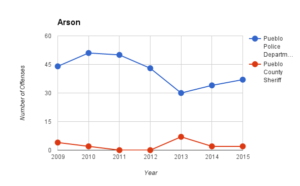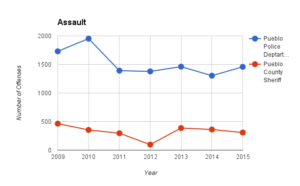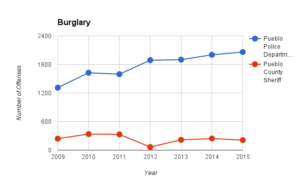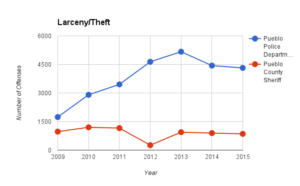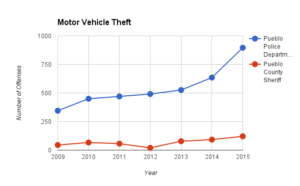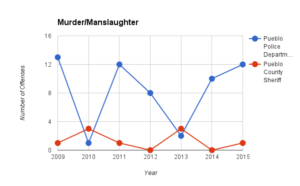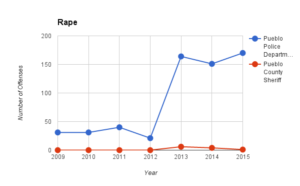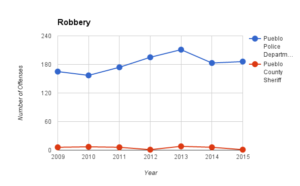Pueblo 5-year Report Card
In 2012, I wrote a post about my reasons for moving to Pueblo, Colorado. After approximately 5 years, 120,000 page views and 500 comments, it’s time for a report card to see how things have worked out.
Real Estate: A
One of the primary reasons for returning to my home town was to invest in Pueblo real estate. In 2010 you could drive around most parts of Pueblo and see obviously distressed properties on nearly every block. Foreclosures were almost the entirety of the market and buyers were few and far between. Now we have a seller’s market with insufficient inventory driving prices higher. Although Pueblo real estate is still very affordable compared to anywhere north along the Front Range, it’s no longer easy to find bargains, at least in residential property. And, due to the lengthy post-2008 construction slump, the supply-demand imbalance seems likely to persist and support steady or higher housing prices near term. Pretty solid turn-around, not unlike many parts of the country, but I think Pueblo’s prospects remain very strong thanks to population growth trends we’re seeing throughout Colorado.
If you’re a lifelong Pueblo native it may be difficult to imagine but a population wave is coming to Southern Colorado. It’s already hit Denver Metro expanding north and south, mostly along I-25, leaving high housing costs and traffic in its wake. The same wave that has filled in open spaces from Fort Collins to Colorado Springs will continue to move south, albeit at a slower pace. Pueblo is already seeing population growth and a lot more will come as high-flying housing prices and crushing traffic in Denver continue to push some residents to relocate. This wave of people seeking the good life in Colorado will generate demand for housing and Pueblo’s economy stands to benefit substantially. This also makes the next decade an important time for Pueblo to get its ducks in a row.
Climate: A
I love Pueblo’s mild, sunny, four-season climate. Think Albuquerque rather than Denver. Summers definitely feel hotter than they were in the 80s but winters are milder too. In the past year, I played golf on Thanksgiving and New Years Day. My style of golf involves no gear except for an 8-iron and a golf ball and I usually only play 3-4 holes, but still, we’re talking year round access to the great Colorado outdoors. The sunshine is particularly valuable as solar becomes a more viable and inexpensive source of energy. We installed rooftop solar in 2015 and it’s been a terrific investment, despite our fox-guarding-the-hen-house situation with Black Hills Energy. Thanks to bountiful solar radiation in Pueblo we produce more than enough electricity for our own needs plus we’re paid for net production. Life is good when Black Hills pays you and not the other way around.
Crime: B
The top concern I hear from prospective Pueblo residents is crime. If you read the comments on my original Why Pueblo post you’ll see many are wary of finding themselves in a dangerous neighborhood. I did a deep dive on crime data this past fall to counter dishonest claims made by the Pueblo Chieftain Editorial Board and a band of like-minded partisans who called themselves Citizens for a Healthy Pueblo (now they call themselves ProPueblo but they should consider renaming themselves Pro-Status-Quo-Pueblo because their primary objective is to keep Pueblo the way it is, complete with vision-free community leadership and a stagnant economy). Despite their efforts to use scare tactics and anecdote to tie marijuana legalization to increased criminal activity, it just ain’t so. They also blame marijuana on the increase in homeless population but they don’t have a shred of proof, nor any meaningful understanding of statistical correlation.
Perhaps because many among them have ties to local hospitals they remain unwilling to acknowledge their own role in creating the real drug problem infecting our community: the Opioid Epidemic. I think a serious effort to understand the true cause of criminal behavior in Pueblo would show a strong connection to opioid and heroin traffic and abuse. Prove me wrong ProPueblo!
K-12 Education: D
The biggest disappointment to me in Pueblo is the sorry state of primary education. The problem is partly driven by national politicized anti-education forces but Pueblo seems to be doing a particularly poor job of defending and nourishing its public schools. There are certainly bright spots in District 60 and District 70 (see my analysis for 3rd Grade, 7th Grade and 10th Grade math performance) and I know families whose children are thriving in Pueblo schools but, overall, Pueblo is failing to provide an adequate primary education system. There are several reasons Pueblo schools are struggling.
Failure of Local Leadership – a few years ago District 60 hired Constance Jones as Superintendent and, from my vantage point, she was doing the right things to improve Pueblo schools. But the D60 school board inexplicably forced her out. I don’t really know the reasoning and it doesn’t seem anyone else in the community really knows either. Check the Pueblo Pulp for an excellent series of articles on the fiasco. I think it comes down to a systemic problem in just about every facet of business in Pueblo. There is a circle-the-wagons mentality. We desperately need outside expertise for Pueblo to grow and prosper but the powers that be in Pueblo prefer to repel the same experts who are in the best position to help the community. I’ve seen this through the lens of a few personal friends who came to Pueblo to run an organization or a department or a business and were essentially forced out because they were too aggressive about pursuing best practices and doing what’s right for their organization. Sadly, small-mindedness runs rampant in Pueblo and holds the community back from reaching its full potential.
Inadequate Private School Options – Pueblo doesn’t have a single private high school. This is really a major problem. Families need options. I suspect both Parkview and St. Mary Corwin have a very difficult time convincing top medical talent to move to Pueblo and I am willing to wager that a top concern is inadequate educational opportunities for children. Private schools in Colorado Springs, including Fountain Valley School, the Colorado Springs School and St. Mary’s Academy, are all enrolling Pueblo students to fill the gap. I’ve heard St. Therese (in Pueblo) has some sort of high school option but my impression is that you can count the number of students enrolled on one hand. It’s also obvious to me that Pueblo needs at least one private school on the north side of the city. All current private school options I’m aware of are south of the Arkansas river while the vast majority of recent residential growth is on the north side of the city. Here’s an idea – use some of the Pedco money to provide a grant for a non-profit to start a private school in the vacant Somerlid Elementary campus on West Street between 27th and 28th. Personally, I favor Montessori methods but any non-sectarian approach will do. I’m willing to bet the 5-year ROI (if it could be accurately measured) would outshine Pewag, Vesta, and any other Pedco-sponsored employer in terms of net positive economic impact.
Political Collateral Damage – just like everywhere in the US, public schools and teacher unions are under attack. In the current anti-civilization political climate championed by the GOP, public schools and public educators are systematically denigrated. In a country where Betsy DeVos is Education Secretary it’s difficult to see how public schools will recover near term. If anything this situation is worse in Pueblo thanks to biased reporting by the Pueblo Chieftain. As if being a teacher answering to demanding parents, administrators and students wasn’t difficult enough they must also deal with the politics of education policy. No wonder so few talented people are pursuing teaching careers.
Sprawl – as people continue to move from within Pueblo city limits to Pueblo West, Blende/Avondale, Beulah, Rye and elsewhere, the tax base for D60 continues to decline. This is a self-reinforcing downward spiral. I’ve written about the problem with sprawl in Pueblo West elsewhere and it’s part of the reason I advocate a toll booth between Pueblo and Pueblo West to counteract the sprawl-induced economic damage. I’m not the only one with this point of view. Joe Minicozzi, an urban planning expert who spoke at a recent Colorado Downtown Inc conference in Pueblo, had this quote published in the Chieftain:
On a per-acre basis, Pueblo West’s high infrastructure costs and relatively low property valuations and tax contributions hurt the economic health of the entire Pueblo area, particularly the city of Pueblo, he said. “It’s just going to drag the whole county down in the process,” said Minicozzi, known nationally for his work on analyzing the economic impact of land use.
Overall: B
Overall, I’ve loved living in Pueblo. I wish I could issue an A grade. It’s my home town and I feel very comfortable investing in Pueblo despite all these challenges. And, I’ll continue to be in Pueblo as I run a technology business with an office in downtown Pueblo, I teach Statistics in the Hasan School of Business at CSU-Pueblo and I own rental properties in Pueblo. But, primarily due to personal struggles with the education system in Pueblo (and we bear as much responsibility for mistakes as any school or district – it’s no picnic advocating for the educational needs of individual children these days), our kids are attending school in Colorado Springs and have been for the past 3 years. As a result my wife and kids’ social circle is in Colorado Springs. And, to make life more convenient for my wife and kids, we have recently relocated to Colorado Springs.
I suppose this will be good fodder for those who want to poke fun at my original blog post and subsequent comments promoting Pueblo. Ha ha, Mr. Pueblo moved to Springs! Have fun with that. But, at the end of the day, I’m not married to Pueblo, I’m married to my beautiful, amazing wife and committed to doing what’s best for our family. So, I’ll be commuting from southwest Colorado Springs for the foreseeable future. And I’m willing to pay a toll for the privilege of doing business in the great city of Pueblo … so long as Pueblo West residents are paying the same toll.
By the way, our house in Pueblo is for sale. Make me an offer and you too can get paid by Black Hills. 🙂


